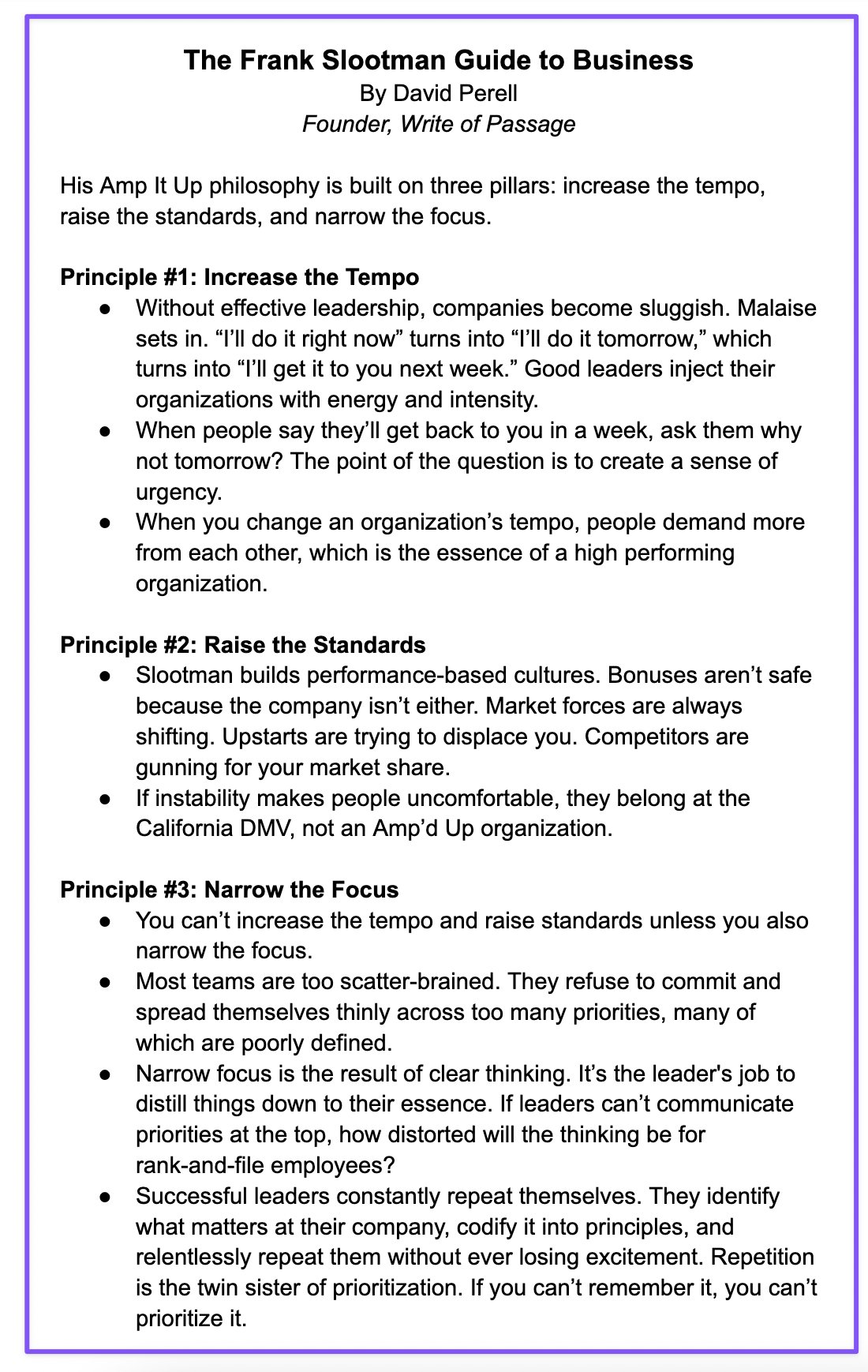Thread
Frank Slootman has taken three companies public, one of which was the largest software IPO of all time.
Here's his playbook for business:
Here's his playbook for business:
Slootman has led three companies: Data Domain, Service Now, and Snowflake — the largest software IPO in history, at a $70 billion valuation.
His Amp It Up philosophy is built on three pillars: increase the tempo, raise the standards, and narrow the focus.
His Amp It Up philosophy is built on three pillars: increase the tempo, raise the standards, and narrow the focus.
Principle #1: Increase the Tempo
Without effective leadership, companies become sluggish. Malaise sets in. “I’ll do it right now” turns into “I’ll do it tomorrow,” which turns into “I’ll get it to you next week.” Good leaders inject their organizations with energy and intensity.
Without effective leadership, companies become sluggish. Malaise sets in. “I’ll do it right now” turns into “I’ll do it tomorrow,” which turns into “I’ll get it to you next week.” Good leaders inject their organizations with energy and intensity.
When people say they’ll get back to you in a week, ask them why not tomorrow? The point of the question is to create a sense of urgency. When you change an organization’s tempo, people demand more from each other, which is the essence of a high performing organization.
Increasing the tempo isn’t just about speed. It’s about fighting incrementalism too. Ask somebody to do something 20% faster, and use conventional strategies. Linear progress is the best you'll get. But if you ask them to do something 2,000% faster, they’ll be forced to innovate.
In the war against incrementalism, Slootman likes to ask CEOs: “How fast can the company grow if they pull all the stops? Can the business start amping up and go asymptotic at some point? When?” Rarely do they have compelling answers to these questions.
Principle #2: Raise the Standards
Slootman builds performance-based cultures. His compensation philosophy enables it. His managers distribute bonuses on a bell-shaped curve so that high-performers are properly rewarded for their outsized contributions.
Slootman builds performance-based cultures. His compensation philosophy enables it. His managers distribute bonuses on a bell-shaped curve so that high-performers are properly rewarded for their outsized contributions.
The problem is that, at most companies, employees receive bonuses without earning them. Since everybody gets the same bonus, the A-players are under-paid. Slootman discovered that to pay your top performers what they deserve, you have pay low performers less.
Bonuses aren’t safe because the company isn’t either. Market forces are always shifting. Upstarts are trying to displace you. Competitors are gunning for your market share. If instability makes people uncomfortable, they belong at the California DMV, not an Amp’d Up organization.
Principle #3: Narrow the Focus
You can’t increase the tempo and raise standards unless you also narrow the focus. Most teams are too scatter-brained. They refuse to commit and spread themselves thinly across too many priorities, many of which are poorly defined.
You can’t increase the tempo and raise standards unless you also narrow the focus. Most teams are too scatter-brained. They refuse to commit and spread themselves thinly across too many priorities, many of which are poorly defined.
Narrow focus is the result of clear thinking. It’s the leader's job to distill things down to their essence. If leaders can’t communicate priorities at the top, how distorted will the thinking be for rank-and-file employees?
Poor focus is poor prioritization. Left to their own devices, people will work on easy and sexy (but ultimately incremental) problems. Leaders can’t let this happen. They have to keep people focused on the levers that move the business the most.
People resist focus because they can’t decide what’s important. Prioritization scares them. Reducing scope goes against human nature. The scope will expand, unless you constrain it with clear and concrete goals.
Successful leaders constantly repeat themselves They identify what matters at their company, codify it into principles, and relentlessly repeat them without ever losing excitement. Repetition is the twin sister of prioritization. If you can’t remember it, you can’t prioritize it.
The fastest way to move a dial is to focus more on it. A company isn’t focused enough unless it’s heartbroken about the projects it’s choosing not to take on. Make people answer questions like: If you could only commit to one thing for the rest of the year, what would it be?
Leaders are always confronting people because a company can only Amp It Up if its leadership upholds the quality bar. Every meeting, every encounter, and every confrontation is a chance to step up the pace, raise expectations, demand excellence, and narrow the plane of attack.
A confrontation is not an argument. Good ones are done calmly, but directly. Leaders should confront problems with a posture of High Care, High Empathy, and Low Emotion. Arguments are just the opposite. They’re born out of Low Care, Low Empathy, and High Emotion.
An essential part of focus is what Slootman calls "working sequentially. Growing companies tend to get distracted. They take on too many projects at the same time. When the organization loses its focus, people lose their sense of direction and feel like they’re swimming in glue.
What is working sequentially?
Say you want to finish ten projects. Don't do them all at the same time. Instead, work on one at a time. Only move on to the next project after you've finished the preceding one. Doing so forces you to prioritize and determine what's important.
Say you want to finish ten projects. Don't do them all at the same time. Instead, work on one at a time. Only move on to the next project after you've finished the preceding one. Doing so forces you to prioritize and determine what's important.
Operators should run strategy. Many companies employ people who do nothing but set strategy. They’re effectively in-house consultants with zero operational responsibilities. Some of them even delegate their strategy to the suits at consulting firms who just tell them what to do.
Leaders should can change their minds fast. You don’t get points for coming up with the answer. You get points for being right and building a successful business. In business, you’re going to get things wrong. Usually, it's okay, so long as you can recognize your mistakes fast.
Mediocrity is the silent killer of organizations. It’s not the C-players who kill your organization. Everybody knows they need to go. It’s the B-players who destroy it. They’re the mediocre ones who are good enough to keep around, but lethargic enough to lower the standards.
B-players slow organizations down by making them bulky. Every organization has too many of them. When you keep B-players, you repel A-players. High-performers want to work with people who are as talented and committed to the mission as they are.
Slootman makes the distinction between drivers and passengers.
Passengers are people who ride the company’s momentum without contributing to it. They’re absent and they rarely take initiative. They are dead weight. Nixing them is the fastest way to increase your company's tempo.
Passengers are people who ride the company’s momentum without contributing to it. They’re absent and they rarely take initiative. They are dead weight. Nixing them is the fastest way to increase your company's tempo.
Hire drivers instead. They get satisfaction from making things happen, not blending in. They increase the tempo, confront poor performance, and are quick to stand up for the company when something’s not right because they have such a strong sense of ownership.
When you apply the Amp It Up philosophy, people radiate ambition, urgency, boldness, and a Heart on Fire. Slootman's system is a triad. Each pillar amplifies the other ones. Slootman asks: "How much faster do you run? How much higher are your standards? How hard do you focus?"

